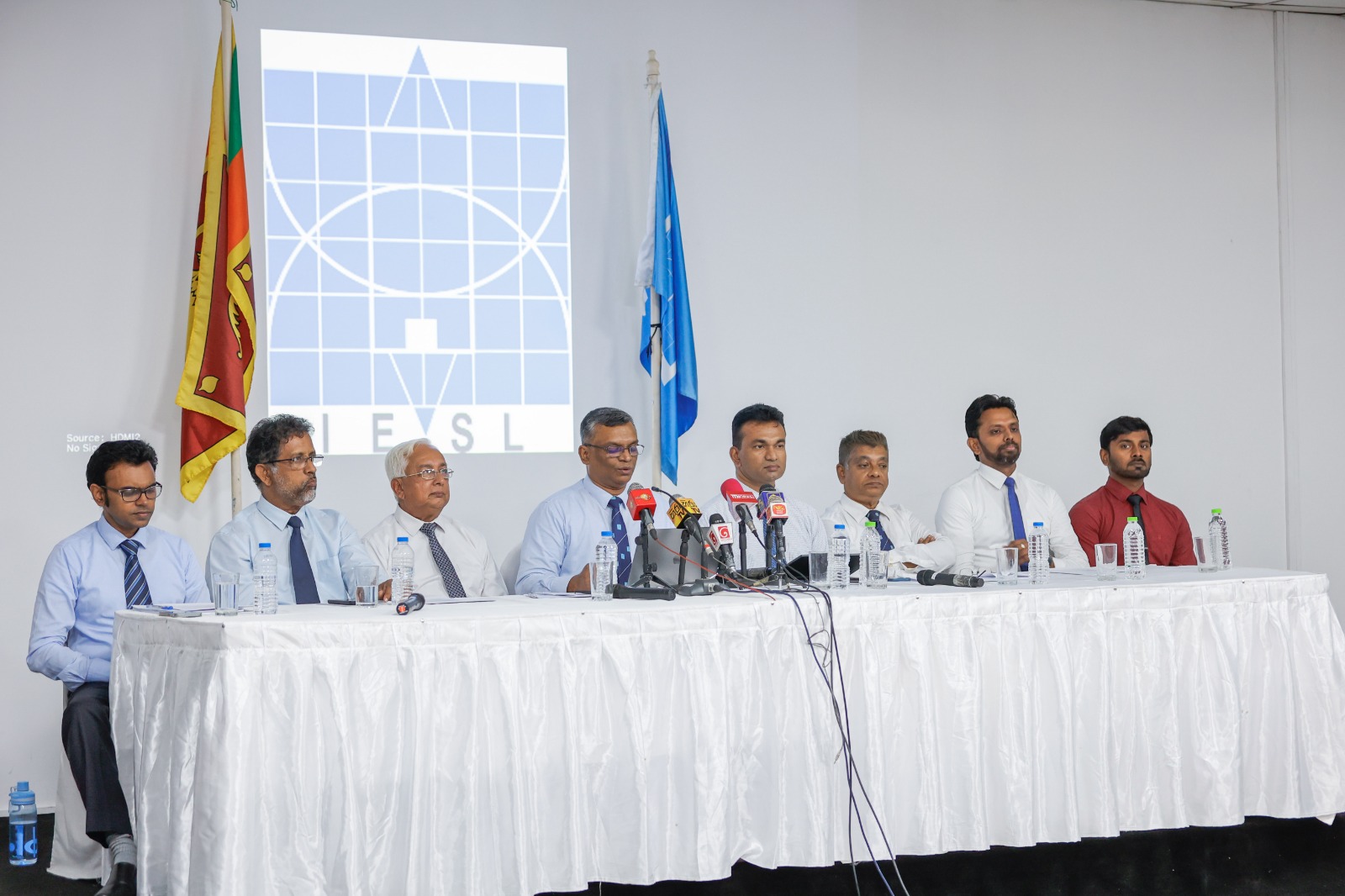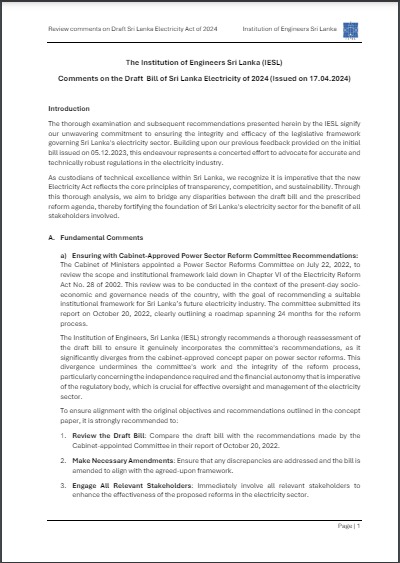Press Briefing on Electricity Sector Reforms
BY PUBLICITY DIVISION (IESL)
The Institution of Engineers, Sri Lanka (IESL), had a press briefing on May 31, 2024, to express the opinion of the IESL about the proposed electricity sector reforms. Press Briefing was chaired by Eng. Kosala Kamburadeniya, Vice-President of the IESL and the Chairman of the Power & Energy Sector Committee of the IESL, Eng. Prof. Asanka Rodrigo - University of Moratuwa, Eng. Prof. Anura Wjayapala - University of Moratuwa, Eng. Prof. Lilantha Samaranayake - University of Peradeniya, Eng. Nihal Wickramasuriya - Former Power Sector Reforms Manager, Eng. Pubudu Niroshana, Eng. Dr. Tilak Siyambalapitiya - Energy Consultant, Eng. Shavindranath Fernando - Past President of IESL and Ex-General Manager of CEB, Eng. Janaka Aluthge, Eng Dushyantha Wanniarachchi - Chairman of the Electrical, Electronics and Telecommunication Sectional Committee of IESL participated in the press briefing and described the major areas to be rectified.

Though there was a requirement for reforms in the electricity sector, the urgency for reforms was triggered due to long-duration power interruptions and an increase in electricity tariffs during the recent economic crisis.
Looking at all these requirements, the Institution of Engineers, Sri Lanka (IESL) appointed a special committee with experts in this sector in June 2022 to address the need for restructuring. On September 26, 2022, IESL submitted a 109-page comprehensive report to the Reforms Committee, following consultation with our general membership and experts. The report covered the main shortcomings in the electricity sector, important features to include in the reforms, important factors to take into account during a restructuring process, various models used in different countries and their successes and failures, and the anticipated results of the reforms.
We did not stop there, and on November 29, 2023, IESL submitted an 11-page report to the Minister, Secretary of the Power & Energy ministry and the Head of the Power Sector Reform Secretariat highlighting the issues in the draft Bill, though it was not officially released.
The first bill was then published in the gazette on December 5, 2023; however, it contained a number of serious mistakes. While some of the IESL's suggestions were taken into account, the majority of the important points that were brought up were either ignored or not taken into consideration.
Again, on 11 Dec 2023, the IESL sent a request to consider the fact we mention in our previous submission to the Minister, Secretary of the Power & Energy ministry, and the Head of Power Sector Reform Secretariat.
Finally, on January 02, 2024, IESL sent a reminder with a summary of the critical items to be reconsidered to the Minister, Secretary of the Power & Energy ministry and to the Head of the Power Sector Reform Secretariat.
The Institution of Engineers firmly believes that the electricity sector needs to be reformed. Unfortunately, the latest bill, released on April 17, 2024, still lacks the important and crucial aspects IESL has repeatedly pointed out.
Following are a few major concerns raised by the IESL.

- Instead of making sector governance simpler and government intervention smaller, the proposed Act creates a new institution called an Advisory Council. It duplicates some functions or transfers some functions of the Public Utilities Commission of Sri Lanka (PUCSL) – the regulator, to the Council.
- The proposed Act hands over the role of the government as the policy maker to the Advisory Council appointed solely by the Minister of Power and Energy. This Council and the Minister have been bestowed with powers to decide on electricity tariff policy and approval of the long-term power generation and transmission plans, too, making a mockery of these highly technical functions handled by the PUCSL so far. Instead of strengthening the existing regulatory functions and capacity of PUCSL, this Act makes PUCSL an agency that merely implements what the Minister and his Council decides. The worldwide best practice is otherwise: a stronger, highly professional and fiercely independent regulator implements the law and the policy through licensing.
- Despite declaring the objects of the proposed Act to be "allowing open competitive procurement of new generation capacity including renewable energy", the body of this Act states the complete opposite. The present practice of procuring renewable energy projects at higher prices through negotiated deals and at feed-in-tariffs that never decrease, has been further strengthened by incorporating it into the main electricity legislation in the country, when most countries have given up such practices long ago to make way for competition. The proposed Act does not have clauses that bring any relief to Sri Lanka's electricity customers, burdened with prices almost double that of competitor countries in the region. Similarly, procurement of transmission capacity can be non-competitive, and in addition this Act allows private transmission lines.
- The proposed Act allows private investments in generation, transmission, and distribution. However, the authority to grant a license to conduct such a business, presently with PUCSL (which is the worldwide practice in power sector reforms), will now be transferred to the Minister by this Act. Such "political" approval of licenses for a commercial business, at a time when Sri Lanka embarks on the next phase of reforms by inviting private investments to transmission and distribution, will make the reforms meaningless.
- With private ownership allowed into 100% of each generation and distribution entity, safeguards to prevent the formation of monopolies are grossly inadequate.
- Technical matters, too, have not been addressed adequately. The grid and technical codes thereof have been defined to be "above 33 kV", ignoring the need for a distribution code in an era where distributed generation is growing and would eventually be the main supplier of generation. This not only brings an unregulated block of generation and power wheeling across distribution networks, without adequate technical safety and economic regulation. Serious control problems leading to brownouts or blackouts cannot be avoided.
IESL calls upon the government to seriously review these glaring shortcomings and amend the proposed Act to ensure the above and other serious deficiencies pointed out by our detailed report are rectified. Without revisions, this Act will further aggravate problems of governance, unreliability, and high costs that have plagued the electricity sector for decades. The proposed Act, if implemented without these amendments, is designed to fail technically and economically, with excessive political interference at every turn.
Download full report





